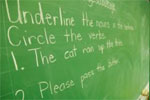Parent-Teacher Conference Dos and Don'ts

Finals are over and done, and grades have arrived. Now comes the dreaded time to discuss the grades. It's Parent-Teacher Conference season again!
Parent-Teacher conferences can be nerve-racking for parents, teachers and students alike. As students get older, Parent-Teacher conferences become less and less important if your student is doing well. But if your student is struggling, Parent-Teacher conferences are crucial.
When you suspect something is going wrong, or if you receive a call requesting a Parent-Teacher conference, there are a few things you should do:
First, if you can, SCHEDULE A TIME WHEN YOU CAN DEVOTE ALL OF YOUR ATTENTION TO THE CONFERENCE. Plan the conference at the end of the day so you don't have to rush to work, and have plenty of time to discuss your child's performance.
Next, PREPARE YOURSELF FOR THE UNEXPECTED. You may hear very interesting things about your student from his instructor. Your student's teacher spends at least five hours a week (for middle school and high school, quite a bit more in elementary school) with your child in a completely different environment than your home. Children-from kindergarten to graduation-will act completely different when they are away from their parents. Your little angel-who minds without question at home-may be the same child who may make a teacher dread going to work in the morning.
TAKE A LIST OF QUESTIONS. Think about what you want to get out of the conference and make sure you get answers to each of your questions. If the conference is about slipping grades, you need to know if your child is just not turning in homework, or if there are more serious problems. Is your student skipping a particular class? What exactly are the behavioral problems the teacher sees?
When you receive the answers to your questions, you need to LISTEN TO THE TEACHER. Don't dismiss the answers to your questions if they are not want you want to hear. Discuss your child's behavior as adults and do not get defensive. If your student's grades are slipping because he is in a higher level class than he should be, think about the teacher's suggestion to transfer him to a lower level class. Again, your teacher sees behavior you may not see. Staying calm and listening politely also sets a good example for your child and lets the teacher know you really care about helping your child improve.
TAKE NOTES. Taking notes at the Parent-Teacher conference can help you remember what is said so you can in turn help your child set goals for improvement.
Notes will also help you DISCUSS THE PARTICULARS OF THE PARENT-TEACHER CONFERENCE WITH YOUR CHILD'S OTHER PARENT OR GUARDIAN(S) to make sure everyone in your student's life is able to help. Children are manipulative-we were when we were their age and human nature has not changed much. If one parent (or grandparent or other family member with the responsibility of raising the child) does not know that homework needs to be checked for completeness, your student is sure not going to tell them.
During the Parent-Teacher conference, BRAINSTORM SOLUTIONS WITH THE TEACHER. Think of things both of you can do to help your student, or to help your student stay accountable. If it takes a daily or weekly email from the teacher with your student's progress, be open to that. If your student's grade slippage is because she is too busy with sports, work, and going out with friends, be open to a teacher's suggestion to cut out something. You may even need to surprise a tardy or absent student at his class one day to make sure he knows you know attendance is important.
SCHEDULE A TIME TO RECONNECT WITH THE TEACHER to get an update. Make an appointment with the teacher in a month to six weeks to discuss your student's improvement or lack thereof.
You may or may not want your child to attend his Parent-Teacher conference. On one hand, you want to convey a united front along with the teacher. On the other hand, some students may feel ganged up on and may shut down completely.
When you get that call, letter, or note requesting a Parent-Teacher conference, don't panic and don't get defensive. Don't immediately believe your child's claims that the teacher doesn't like her, but also remember that the teacher doesn't have the history with your child that you do.
But both of you care about your child's education, and that's what you need to remember.
- Educators and Childhood ObesityObesity in childhood is rising to epidemic proportions in America and educators should be concerned. The statistics of obesity in children are alarming. Using the 95 percentile and higher of body...
- Teaching Your Child Study SkillsMany children who have the capability to get good grades experience frustration because of low academic scores. The reason for this is that they don't have the necessary study skills. In order to...
- The Importance of Ninth GradeStudents who are entering ninth grade do not realize the importance of the critical decisions they will be making during the next four to five years. The junior year of high school, ninth grade, is...
- Changing Schools Isn't Easy: Tips for a Successful TransitionIt isn't easy for students to make the transition into a new school, especially if they have grown-up in a close knit community. Changing schools can be very stressful, fill them with anxiety and,...
- Teacher Tenure: A Double-Edged SwordTeacher Tenure (the policy making it almost impossible to fire teachers) has noble roots. It was created to prevent a complete administration change when a new superintendent or principal arrived at...





